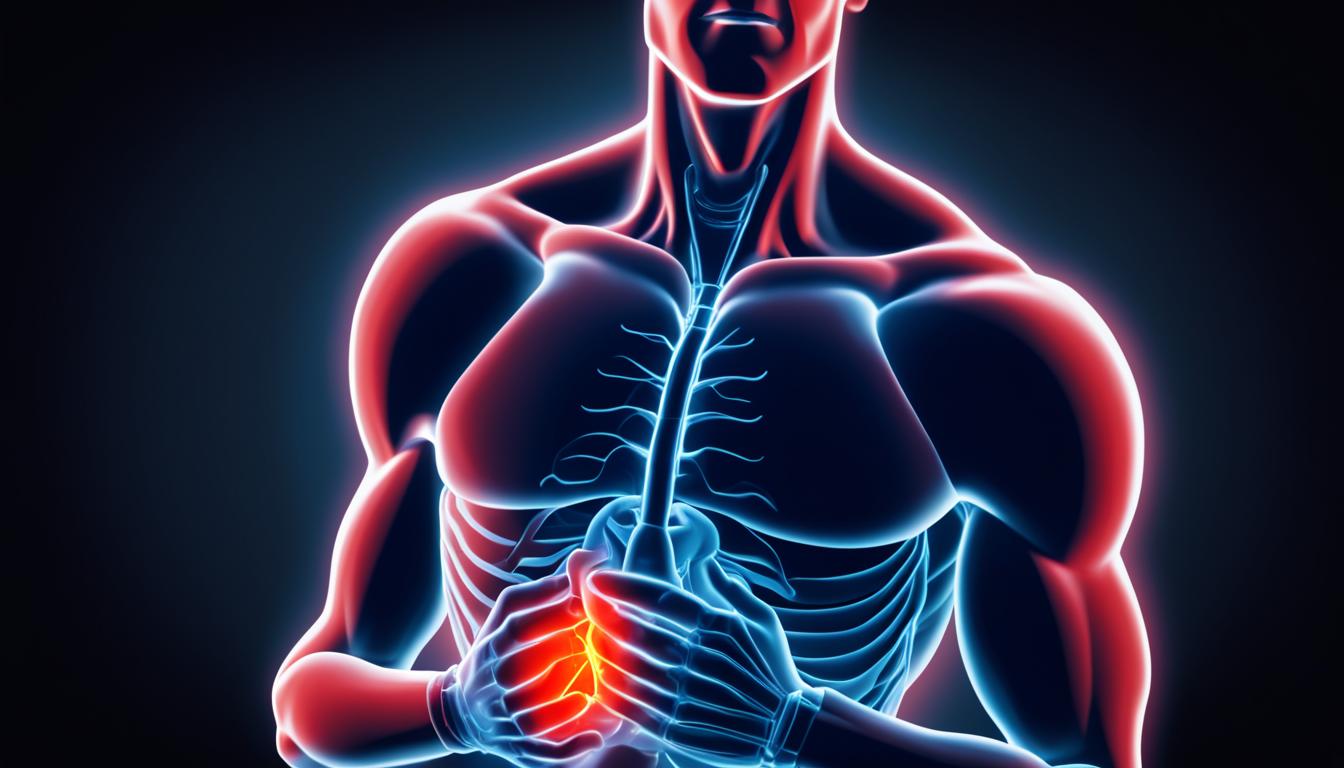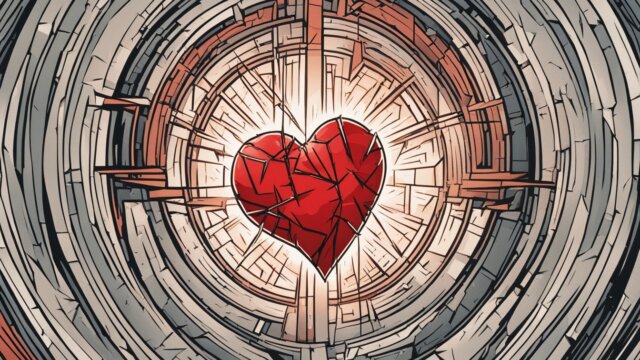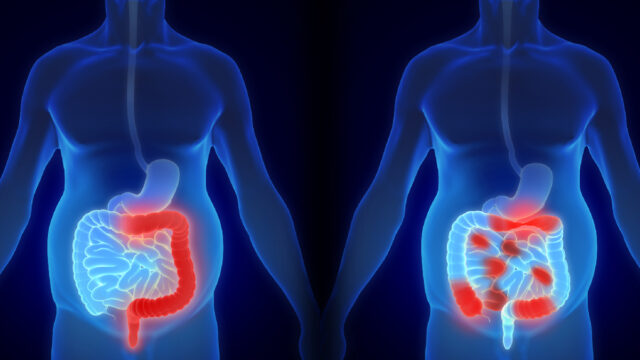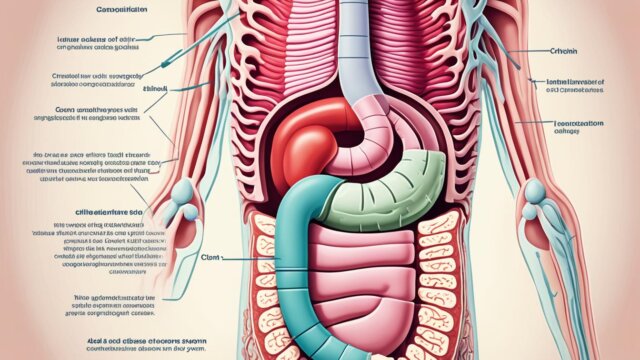FTC disclaimer: This post may contains affiliate links and we will be compensated if you click on a link and make a purchase.
Chest pain can be scary and worrying. It can come from many things, from mild to serious. If you feel a dull ache, a sharp pain, or a heavy feeling in your chest, it’s important to know what could be causing it and when to get help.
Heart or blood vessel issues can cause chest pain. This includes angina or a heart attack, which feels like tightness or heavy pressure. A tear in the aorta can also cause sudden, severe pain in the chest and back. Lung problems like a blood clot or pneumonia can make you feel sharp chest pain.
Chest pain isn’t just about the heart and lungs. It can also come from the digestive system, like esophagus spasms or stomach problems. Other causes include panic attacks, chest inflammation, shingles, and muscle strains.
Key Takeaways
- Chest pain can have a variety of underlying causes, including heart, lung, and digestive issues.
- Sudden, severe, or crushing chest pain, especially if accompanied by other symptoms like nausea or shortness of breath, may indicate a medical emergency and require immediate attention.
- Risk factors for heart-related causes of chest pain include family history, smoking, obesity, and existing health conditions like high cholesterol or diabetes.
- Healthcare providers will ask detailed questions about the characteristics of your chest pain to help determine the underlying cause.
- Prompt medical evaluation and appropriate treatment are crucial for managing chest pain and addressing any underlying conditions.
Understanding Chest Pain
Chest pain can feel like a sharp, stabbing sensation or a dull ache. It can also feel like burning or a squeezing sensation. The pain might be in one spot or spread out to other areas like the neck, jaw, back, or arms.
The pain’s intensity and how long it lasts can vary. Some pains last just a few minutes, while others can go on for hours or even days.
What Chest Pain Feels Like
People with typical angina often feel a squeezing or pressure in their chest. But, chest pain from other causes can come on suddenly and not be related to exercise. It can last for different amounts of time.
Exercise can cause soreness in the chest muscles. This soreness usually affects certain areas and gets worse in some positions.
When to Seek Immediate Medical Help
If you have new or strange chest pain, especially if it’s bad or doesn’t go away, get help right away. Signs like shortness of breath, sweating, nausea, or dizziness could mean a serious issue like a heart attack or aortic dissection. You should get checked out quickly.
About 31% of chest pain cases in the ER are from acute coronary syndrome (ACS). Aortic dissection is a rare but serious cause of chest pain that might need emergency surgery. Other conditions like hypertrophic cardiomyopathy, mitral valve prolapse, and aortic stenosis can also cause chest pain.
Gastroesophageal reflux disease (GERD) is a common reason for chest pain, making up 30% of cases. Other possible causes include esophageal spasm, motility disorder, esophagitis, pulmonary embolism, and pneumonia.
Heart-Related Causes of Chest Pain
Chest pain can come from many things, but heart problems are very serious. We will look at three heart issues that cause chest pain: angina, heart attack, and aortic dissection.
Angina
Angina happens when the heart doesn’t get enough blood and oxygen. It feels like pressure or tightness in the chest. It can also be felt in the arms, shoulders, neck, or jaw.
Stable angina is common and happens with certain activities or stress. Unstable angina is worse and can happen even when you’re not doing much. It might mean a serious heart problem.
Things like smoking, high blood pressure, and high cholesterol can make you more likely to get angina.
Heart Attack
A heart attack, or myocardial infarction, happens when a blood clot blocks blood flow to the heart. This can cause very bad chest pain that spreads to other areas. You might also feel short of breath, have cold sweats, feel nauseous, or dizzy.
Getting help right away is very important because a heart attack can be deadly.
Aortic Dissection
Aortic dissection is a rare but very serious issue. It happens when a tear in the aorta, the main artery, blocks blood flow. This can cause very bad, tearing or ripping chest pain that goes to the back or belly.
This is a very serious emergency that needs quick medical help to stop worse problems.
Lung-Related Causes of Chest Pain
Chest pain can come from many things, but some are linked to the lungs. Issues like pulmonary embolism and pleurisy can cause chest pain.
Pulmonary Embolism
A pulmonary embolism is a serious issue. It happens when a blood clot moves from the legs or pelvis to the lungs and blocks blood flow. This blockage can cause sudden, severe chest pain, shortness of breath, and a fast heartbeat. Sometimes, you might also have a fever or cough up blood. Quick medical help is key to avoiding serious problems.
Pleurisy
Pleurisy, or pleuritis, is when the lining around the lungs gets inflamed. This can make chest pain sharp and stabbing. It gets worse when you breathe deeply, cough, or sneeze. Pleurisy can be caused by infections, blood clots, or certain diseases like rheumatoid arthritis or lupus.
Other lung problems can also cause chest pain. A collapsed lung (pneumothorax) can lead to sudden chest pain and trouble breathing. Pulmonary hypertension, or high blood pressure in the lung arteries, can also cause chest pain.
If you have sudden, severe, or ongoing chest pain, see a doctor right away. They can figure out what’s causing it and give you the right treatment.
Digestive Causes of Chest Pain
Chest pain can come from many things, including digestive problems. GERD and peptic ulcers are two common causes.
Gastroesophageal Reflux Disease (GERD)
GERD happens when stomach acid goes back up into the esophagus. This causes a burning feeling in the chest. It can also make you feel chest pain, which might feel like heart pain.
Things like certain foods, being overweight, being pregnant, or smoking can make GERD worse.
Peptic Ulcers
Peptic ulcers are sores in the stomach or small intestine lining. They can cause a dull, aching chest pain. This pain might feel better after eating or taking antacids.
These ulcers are often caused by a germ or by some painkillers.
If you have ongoing or bad chest pain, see a doctor. They can find out what’s causing it and help you get better.
Remember, digestive problems can cause chest pain. But, you should see a doctor to figure out why and get the right treatment.
Musculoskeletal Causes of Chest Pain
Chest pain can come from musculoskeletal issues like problems with the ribs, muscles, or cartilage. Conditions like costochondritis, where the cartilage connecting the ribs to the breastbone becomes inflamed, can cause sharp, localized chest pain. Also, injuries to the ribs, like bruising or fractures, can make chest pain worse when you move or breathe deeply.
Musculoskeletal issues are a big part of chest pain, affecting 20.6% to 46.6% of people. Musculoskeletal conditions were found in 6.2% of patients in the hospital with chest pain. Costochondritis is the most common, affecting 13% of patients in one study.
Other musculoskeletal causes include sternalis syndrome, Tietze’s syndrome, sternoclavicular hyperostosis, and chest pain from conditions like rheumatoid arthritis, ankylosing spondylitis, and psoriatic arthritis. Studies have looked at how pain can spread to different parts of the chest from certain muscles and ligaments.
Finding the musculoskeletal cause of chest pain can be hard. Current ways to score musculoskeletal chest pain don’t work well. But, finding tender spots, making pain worse with touch, and pain from certain movements can help diagnose it. Sometimes, tests like a chest X-ray or bone scan are needed to check for things like broken ribs or stress fractures.
Treating musculoskeletal chest pain often means managing pain, resting, and using the RICE method for muscle strains and injuries. Stress fractures of the ribs can happen in athletes who do a lot of upper body work, especially if they have osteoporosis or lack vitamin D. Fibromyalgia can also cause chest pain, along with tiredness and stomach problems.
It’s important for doctors to understand musculoskeletal causes of chest pain to diagnose and treat it right. By knowing these causes, doctors can make better treatment plans to help their patients feel better.
“Costosternal syndrome frequency reported as 66% in a study titled ‘Costosternal syndrome: its frequency and importance in differential diagnosis of coronary heart disease.'”
“Frequency and importance of costochondritis mentioned in a study titled ‘Costochondritis’ published in N Engl J Med in 1977.”
“Chest wall syndrome as a common cause of unexplained cardiac pain at 8% of cases, as mentioned in a study published in JAMA.”
Chest Pain and Anxiety Disorders
Chest pain is often linked to heart issues, but it can also show up with anxiety, especially during a panic attack. Panic attacks bring on intense fear or discomfort. They can cause chest pain, fast heartbeat, shortness of breath, and sweating. These signs can feel like a heart attack but aren’t dangerous. Still, it’s key to see a doctor to check for other health problems.
Panic Attacks and Chest Pain
Anxiety can cause many physical symptoms, including chest pain. About 25 to 50 percent of people with chest pain in the ER have a lot of anxiety. This stress can make muscle tension and chest pain worse. High levels of adrenaline and cortisol from anxiety can lead to panic attacks, making it hard to tell from a heart attack and raising the risk of heart disease.
Doctors can teach ways to manage anxiety and lessen chest pain. Medicines for anxiety have downsides but can help while you learn to cope. Therapy like cognitive behavioral therapy (CBT) has shown to help with anxiety-related chest pain.
Heart attack chest pain spreads and reaches the jaw, shoulders, and arms. Anxiety chest pain stays in the chest. Heart attack pain starts slow and gets worse, unlike anxiety’s sudden onset and slow fade. Anxiety can also weaken the heart, cause heart failure, and lead to abnormal heart rhythms, mimicking a heart attack.
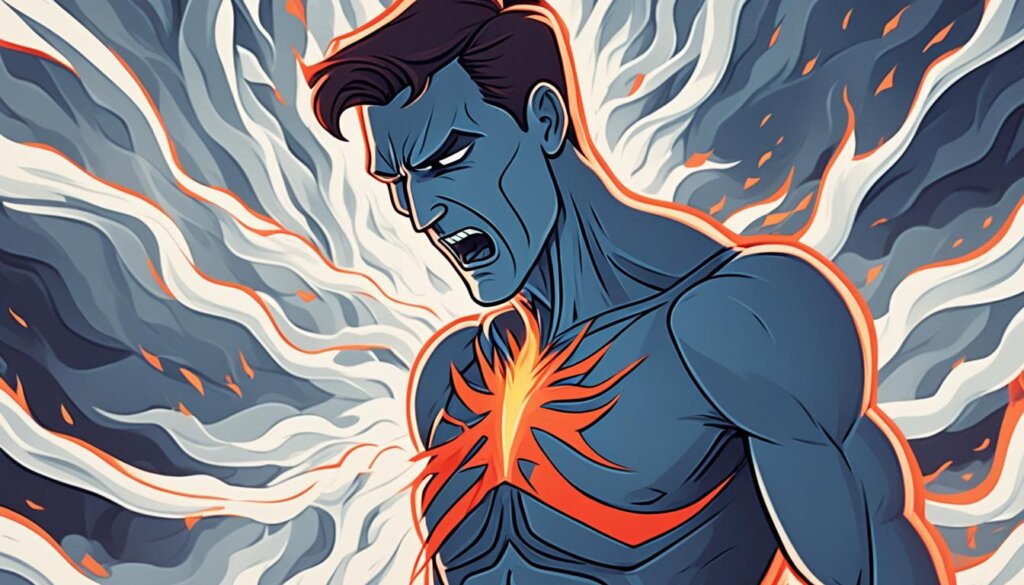
If you have chest pain, see a doctor to check for health issues. Anxiety-related chest pain isn’t dangerous, but dealing with the anxiety is key to avoiding health problems.
Chest Pain and Other Conditions
Shingles
Shingles is a viral infection that causes a painful rash. This rash can lead to chest pain. The rash looks like a band of blisters on one side of the chest or back. The pain from the nerves can feel like burning, stabbing, or aching in the chest.
This pain can be very uncomfortable. It may need special treatment to help with the infection and nerve pain.
Shingles happens when the varicella-zoster virus comes back to life. This virus caused chickenpox before. After chickenpox, the virus stays in the body’s nerves. It can wake up again later, especially if your immune system is weak.
The pain from shingles nerves can be very strong. It can last for weeks or even months after the rash goes away.
If you have chest pain with a rash, see a doctor right away. They can tell you if you have shingles. They can give you medicine to fight the infection and lessen nerve pain. Getting treatment quickly can also make the outbreak shorter and less severe.
“Shingles is a painful rash that develops on one side of the body, often the chest or back. The rash can cause a burning, stabbing, or aching sensation, which can be a significant source of discomfort.”
Shingles can also cause fever, headache, and sensitivity to light, besides the rash and nerve pain. If you think you have shingles, see a doctor quickly. This helps stop the virus from spreading and helps manage your symptoms.
Risk Factors for Chest Pain
Some things can make you more likely to get chest pain, especially if it’s from the heart. Knowing these risk factors helps you prevent or manage chest pain and heart issues.
- Family history of heart disease
- High blood pressure
- High cholesterol
- Diabetes
- Obesity
- Smoking
- Sedentary lifestyle
Being older, especially men over 45 and women over 55, raises the risk of chest pain and heart issues. Bad eating habits, not moving much, and stress can also lead to chest pain and heart disease.

Working with your doctor to find and deal with risk factors is key. Managing high blood pressure, cholesterol, and diabetes can lower your risk of chest pain and heart problems. Exercise, eating right, and managing stress are also important for a healthy heart and avoiding chest pain.
Diagnosis of Chest Pain
When a patient has chest pain, doctors start by taking a detailed history and doing a full physical check-up. This helps figure out why the pain might be happening. They look for health issues, recent sickness, or injuries, and what the pain feels like. The check-up might include checking vital signs, listening to the heart and lungs, and feeling the chest.
Medical History and Physical Examination
Getting the medical history and doing a physical exam is key to finding out why someone has chest pain. Doctors want to know how long, where, and how bad the pain is. They also ask about other symptoms like trouble breathing, sweating, or pain that spreads out.
Diagnostic Tests
Doctors might order tests based on what they think is causing the chest pain. These tests can include an ECG to check the heart’s electrical activity, blood tests for heart attack signs, and imaging tests like a chest X-ray or CT scan to see the heart and lungs. These tests help confirm what’s causing the pain and guide treatment.
Diagnostic Test | Purpose |
|---|---|
Electrocardiogram (ECG) | Evaluates the heart’s electrical activity |
Blood Tests | Checks for signs of a heart attack or other conditions |
Chest X-ray | Visualizes the heart, lungs, and blood vessels |
CT Scan | Provides detailed images of the heart and chest |
Angiogram | Evaluates the blood vessels and blood flow to the heart |
By using a detailed medical history, physical check-up, and specific tests, doctors can find out why someone has chest pain and plan the right treatment. This careful approach is key to helping patients get the best care for their chest pain.
Treatment Options for Chest Pain
The treatment for chest pain depends on what’s causing it. Doctors might give you medicine like nitroglycerin for angina. They might also give you blood thinners or anti-inflammatory drugs. Sometimes, they use pain relievers or antacids to help with the pain.
Medications
Angina pectoris happens when the heart muscle doesn’t get enough blood. This is because the arteries are narrowed or blocked. Nitroglycerin helps by making the arteries relax and easing the heart’s work.
Beta-blockers and calcium channel blockers help prevent angina by lowering blood pressure and the heart’s workload.
ACE inhibitors and angiotensin II receptor blockers also help by lowering blood pressure and cutting down the risk of heart attack.
Statins and antiplatelet drugs are used to lower bad cholesterol and prevent blood clots. This helps prevent heart attack and stroke.
Lifestyle Changes
Changing your lifestyle can help manage and prevent chest pain, especially if it’s related to the heart. You might need to quit smoking, eat healthy, exercise, and manage conditions like high blood pressure or diabetes. These changes can make your heart healthier and lower the risk of chest pain.
Surgical Interventions
Sometimes, you might need surgery to fix the cause of chest pain. For severe coronary artery disease, doctors might do coronary artery bypass surgery. Or they might place a stent to open blocked arteries. These surgeries are usually for serious or life-threatening conditions.
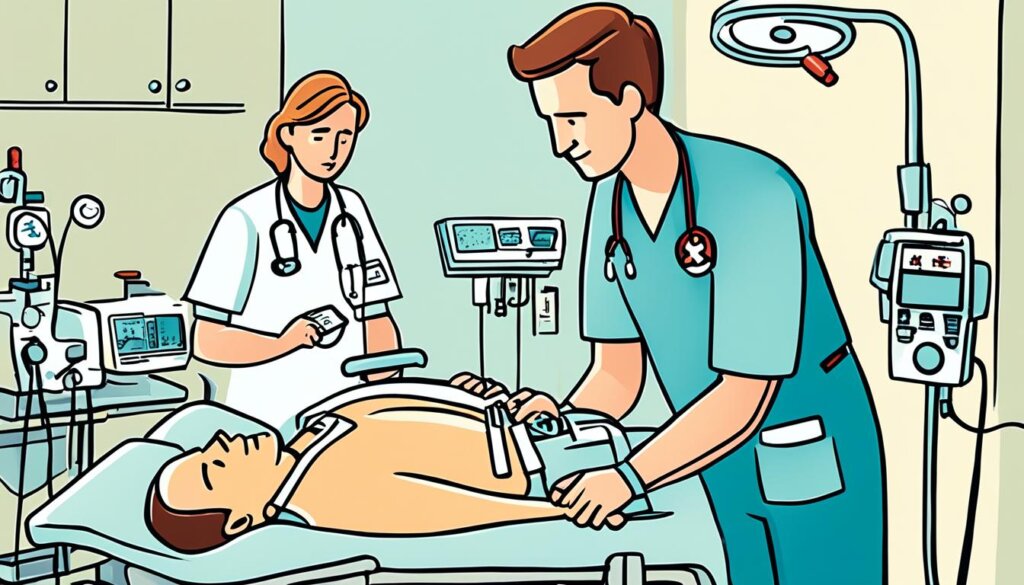
Finding out what’s causing chest pain is key to treating it. Doctors use tests like an electrocardiogram (ECG), chest X-ray, blood tests, and upper GI endoscopy. The treatment can include changing your lifestyle, taking medicine, or having surgery. It depends on the cause of the pain and your health.
Preventing Chest Pain
Keeping a healthy lifestyle helps lower the risk of chest pain, especially from heart issues. Simple steps can protect your heart and cut down on chest pain.
Prioritize Your Heart Health
Eat well, stay active, and keep a healthy weight are key for your heart. Add fruits, veggies, whole grains, lean meats, and healthy fats to your meals. Do at least 30 minutes of exercise like walking, biking, or swimming each week to keep your heart in good shape.
Being overweight or obese can lead to heart-related chest pain. Work with your doctor to lose weight safely through diet and exercise.
Manage Stress and Reduce Harmful Habits
Stress can hurt your heart, so it’s vital to manage it well. Try meditation, yoga, or deep breathing to relax. Quit smoking and drink less alcohol to avoid chest pain and heart issues.
Regular doctor visits can spot and treat health problems that cause chest pain. They might use tests like ECGs, blood tests, X-rays, CT scans, and stress tests to check your heart.
Living a healthy life and working with your doctor can help prevent chest pain. Your health is important, and a healthy lifestyle has many benefits beyond just avoiding chest pain.
Chest pain
Chest pain is a common symptom with many possible causes. It can come from the heart, lungs, or digestive system. It can also come from musculoskeletal issues or anxiety disorders. Knowing the types of chest pain and their causes is key. Some conditions, like a heart attack, need quick medical help to avoid serious problems.
Chest pain can feel like a dull ache or a sharp pain. Where the pain is and how long it lasts can tell us what’s causing it. For example, pain that doesn’t go away after 15 minutes might be a heart attack sign. Pain that happens when you move might be angina.
Some lung issues, like a blood clot or pleurisy, can make chest pain worse when you breathe. Digestive problems, like acid reflux or gallbladder issues, can also cause chest pain. Musculoskeletal issues, like pulled muscles or inflammation, can cause pain too.
Some people with anxiety might feel chest pain during panic attacks. Shingles, a viral infection, can also cause severe chest pain.
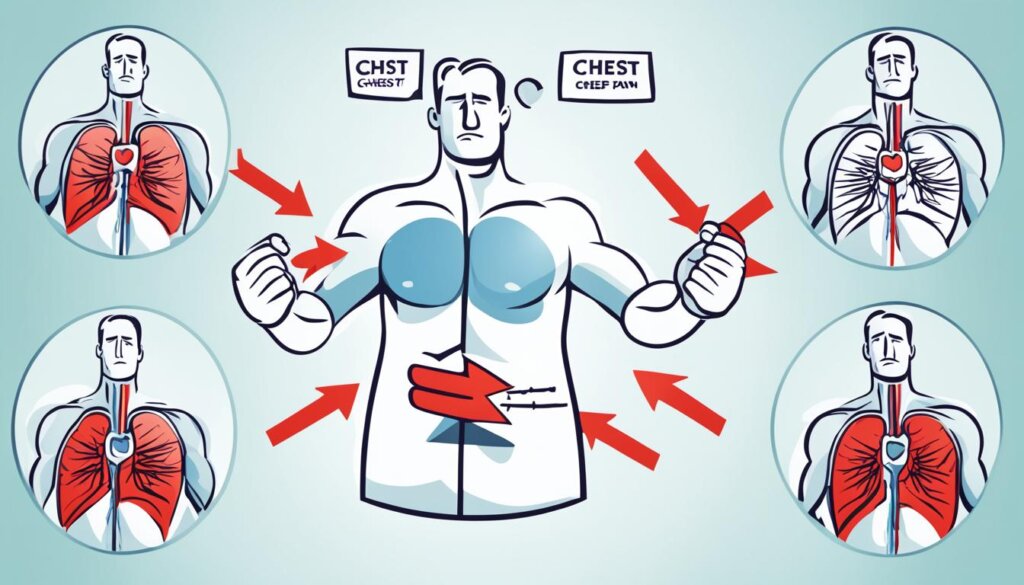
If you have chest pain, see a doctor fast. This is especially true if the pain is bad, lasts a while, or you have other symptoms like trouble breathing, feeling sick, or dizzy. Your doctor will check your health history, do a physical exam, and might run tests to find out why you have pain. Then, they can give you the right treatment.
Conclusion
Chest pain can have many causes, from simple to serious health issues. It makes up 3% of all visits to doctors, with 1.7% of all visits being about it. Most of the time, it’s from muscle or bone problems, but it can also be from heart, mental, or lung issues.
Knowing about the types of chest pain and what might cause it is key to keeping your heart healthy. Every year, over 6.5 million people go to the ER for chest pain in the U.S. Even mild chest pain can mean a higher risk of heart attack in the next 30 years.
Those with the worst chest pain and shortness of breath are at a higher risk of heart attack and other heart problems. They are also more likely to have stroke or heart failure.
By understanding chest pain, you can take steps to protect your heart health. Being aware of the causes and signs can help you keep your heart strong and healthy.
FAQ
What is chest pain?
Chest pain is a symptom with many possible causes. It can be sharp, dull, burning, aching, or crushing. It might spread to the upper body.
When should I seek immediate medical attention for chest pain?
Get help right away for new or unknown chest pain. This is true if it’s severe or with symptoms like shortness of breath or sweating. These signs could mean a heart attack or aortic dissection and need quick action.
What is angina and how is it different from a heart attack?
Angina is chest pain from less blood and oxygen to the heart. It feels like pressure or tightness in the chest. It can also be in the arms, shoulders, neck, or jaw.
Angina can be stable or unstable. Stable angina happens with certain activities or stress. Unstable angina is severe and can happen at rest, showing a serious heart issue. A heart attack is when a blockage cuts off blood to the heart muscle, causing severe pain that spreads to other areas.
What are some other causes of chest pain besides the heart?
Chest pain can come from the lungs, like a blood clot or pleurisy. It can also be from the digestive system, such as acid reflux or ulcers. Musculoskeletal issues or anxiety, especially during a panic attack, can cause it too.
How is the cause of chest pain diagnosed?
Doctors start by taking a detailed history and doing a physical exam. They might order tests like an ECG, blood tests, or imaging tests. These help find the cause of the chest pain.
How is chest pain treated?
Treatment depends on the cause of the pain. Doctors might prescribe medications like nitroglycerin for angina or anticoagulants for blood clots. Surgery might be needed for some conditions.
What can I do to prevent chest pain?
Living a healthy life can lower the risk of chest pain. Eat well, exercise regularly, keep a healthy weight, manage stress, and avoid smoking and too much alcohol. Regular doctor visits can also help spot and treat health issues early.
